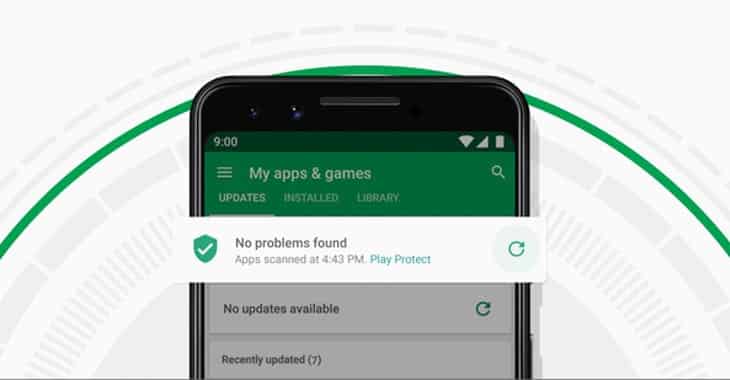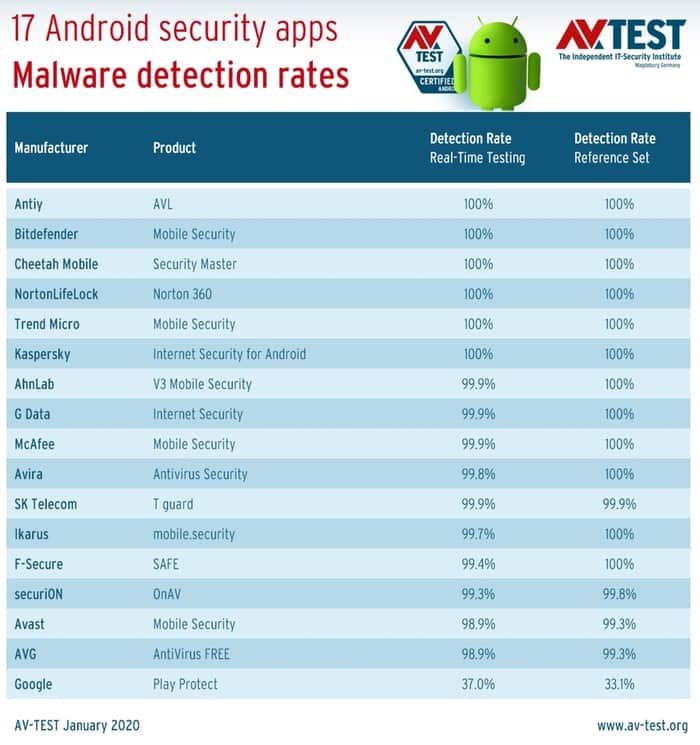
If there’s one clear message you can take away from the latest real-world test of Android security products, it’s that relying upon Google to protect your smartphone isn’t really good enough.
Independent anti-malware testing lab AV-Test pitted 17 Android security apps, including Android’s own built-in Google Play Protect, against nearly 6,700 malicious apps.
3,300 of the malicious apps were considered “totally new” – having been discovered in the previous 24 hours. The remainder of the malware, described as the “reference set”, was compromised of what AV-Test described as “particularly widespread apps that have already been in circulation for up to four weeks.”

Six of the 17 apps tested (Antiy AVL, Bitdefender Mobile Security, Cheetah Security Master, Norton 360, Trend Micro Mobile Security, and Kaspersky Internet Security for Android) achieved a perfect real-time detection rate of 100% against the “totally new” malicious apps and the additional reference set.
The apps from AhnLab, G Data and McAfee performed admirably too – detecting 99.9% in the real-time detection test, and a perfect score against the reference test set
But Google’s Play Protect fell far behind with just a 37% detection rate against the new malicious apps seen in the past 24 hours, and 33% against Android malware seen in the preceding four weeks.
To make things even worse, Google Play Protect incorrectly false alarmed on 30 harmless apps – misidentifying them as malicious.
As AV-Test explains, the message is pretty clear for Android users who want to reduce the chances of malicious apps running on their smartphone:
“As the detection rates of Google Play Protect are really quite poor, the use of a good security app is highly recommended.”
What’s worrying about that is, in my experience, most Android users haven’t installed a security app onto their phone – perhaps assuming that it’s not necessary, or more trouble than it’s worth.
Despite these disappointing results for Google Play Protect, it’s worth remembering that one of the best things Android users can do to reduce their exposure to malicious apps is to only install apps from the official Google Play marketplace rather than side-load apps from third-party sources.



I tried installing a few of these apps and I'm not sure I see a difference between Trend Micro's or BitDefender's data collection policies and the apps they're protecting you from. And we all know about Cheetah Mobile's abuses. Are these apps preventing data leaks or simply eliminating the competition?
What about Sophos (free) and ESET (paid for)?
What about LOOKOUT also?
There is typo error on title above "malicious"
Whoops! Now fixed. Thanks!
How have you guys not tested eSet?
I'm not the guy who tested the products. AV-Test.org conducted the test.
Agree with several other comments. ESET and Lookout really should be included in these sort of tests. I'm not sure why they are so often neglected. Particularly when there are so many other no-name or questionable security tools that make these lists.
You should ask the vendors and/or AV-Test.org.
I believe it's the case that sometimes vendors choose not to submit their products for testing. That may not necessarily be because they expect their products to perform poorly – they may have other reasons.
Why no bullguard review
See the answer I gave above. You should ask Bullguard why they weren't included. It may be that they didn't submit their product for testing.
What about Malwarebytes?
The test is incomplete without ESET included. Please inform the testers. :)
I'm sure the testers know that ESET wasn't included. ESET is included in some of AV-Test's other tests, so I imagine that for some reason ESET chose not to submit their product for inclusion in the Android test.
I use AVG antivirus app.cause problems
In Android phone, I uninstall app. Google play protect is it safe to have? Someone using my phone installing Unknown apps. can't open uninstall them.
Limited mobile data some one else is using mine not in use.
Do anybody believe me? Thank you.
The first one, AVL, has not been updated since 2018